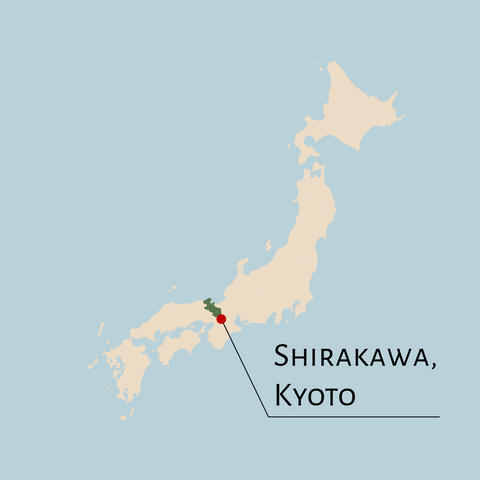



Shirakawa Samidori Matcha
Seicha TsujikiKiyoharu Tsuji’s Samidori takes the milky, creamy notes this cultivar is known for to the next level in this incredibly smooth tea.
Producer: Tsujiki
Region: Shirakawa, Kyoto
Cultivar: Samidori
Harvested: May 1, 2024
Picking: Hand-picked
Located a short drive south of Uji City, Shirakawa's tea fields are nestled among rolling hills. This area is lnown primarily for producing high-grade gyokuro. Though much smaller than the nearby Wazuka and Ujitawara regions, Shirakawa is a prime growing area for top-tier Ujicha.

Not to be confused with the more popular Saemidori, Samidori is a classic Uji cultivar. Though it is one of the oldest cultivars, bred by Uji tea breeder Koyama Masajirou (小山 政次郎) in 1939, it is technically unregistered. It was developed to be suitable for shaded teas, with leaves that grow vertically for easy hand-picking.
Today, Samidori is commonly grown in Kyoto for use in gyokuro and matcha where the cultivar’s bright green colour and deep umami shine through.
Brewing Instructions

Seicha Tsujiki (製茶辻喜)
This tea producer needs no introduction. Headed by fifth generation tencha farmer, Tsuji Kiyoharu (辻喜代治) whose name is legendary in the tea world, they have won countless prestigious awards for their peerless matcha. Tsuji-san’s personal mission is to push the boundaries of matcha production by combining traditional techniques with cutting-edge techniques and his own creativity and ingenuity. In doing so, he has set records for the amount of amino acids (umami compounds) concentrated in his tea leaves, at percentages over double the usual amount. His teas have won first place recognition on the regional and national level multiple times, making him the most awarded tencha farmer in Japan.

Tsujiki’s extreme level of umami comes from an equally extreme approach to tencha production. Tsuji-san uses a top-secret self-crafted mix of high-grade organic fertiliser, which he applies to the plants at double the normal rate, stuffing the leaves full of nutrients and umami compounds. On top of this, he shades his plants at 95% darkness, 10% more than most farms, which further amplifies and concentrates the umami. Lastly, he picks his plants only once per year, entirely by hand, ensuring that the maximum amount of umami can be presented in the final tea.
